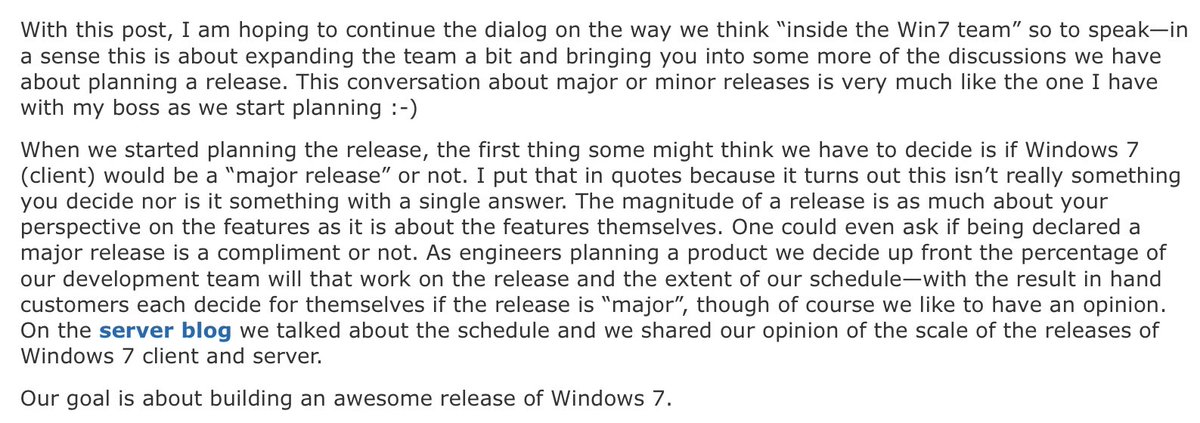
iOS and iPadOS 15: MacStories Review // Worthwhile read for a lot of details about releases.
If you’ve been looking at Apple software releases for any time then you know “major”, “minor”, or “incremental” are all the wrong descriptors and upset me! 🙀 1/ macstories.net/stories/ios-an…
If you’ve been looking at Apple software releases for any time then you know “major”, “minor”, or “incremental” are all the wrong descriptors and upset me! 🙀 1/ macstories.net/stories/ios-an…
2/ What Apple does is “relentless execution” coupled with a “long-term and focused point of view”.
And they do that by releasing Every. Single. Year. At. The. Same. Time.
I guess after all this time, this fact is so taken for granted that we sometimes fail to appreciate it.
And they do that by releasing Every. Single. Year. At. The. Same. Time.
I guess after all this time, this fact is so taken for granted that we sometimes fail to appreciate it.
3/ This goes back to Apple history and failure to delivery the OS releases reliably. Of course everyone was failing to release software on time back then (even on mainframes). But Apple, much like Microsoft, teetered between betting too big and scrambling something out the door.
4/ At the same time, Jobs (and much of the Mac team, particularly people like Scott Forstall and years later Craig Federighi) delivered releases of this new OS on more of a schedule than most anyone else in the OS biz.
All while Apple was struggling with System 7.x and later.
All while Apple was struggling with System 7.x and later.
5/ Once NeXT joined Apple and OS “merger” happened, not only did Apple have a modern OS, but release cadence was put in place.
Key point: the cadence was set by a calendar (a conference!) not by a feature list. Whole process oriented around gaining and maintaining momentum.
Key point: the cadence was set by a calendar (a conference!) not by a feature list. Whole process oriented around gaining and maintaining momentum.

6/ Look at that timeline from 2001. Even if all they ever did was Mac, then that would be an insane accomplishment. The fact that they also replumbed the OS for Intel along the way and built the hardware was a bonus.
7/ THEN (by the way!) they took the OS and scaled it back and ported it to ARM to build…a phone. And they still released updates to the Mac.
8/ And also along the way they released a tablet, a TV set top box, and a watch. All built from the same OS.
So that’s what they’ve been doing.
So that’s what they’ve been doing.
9/ Power users and people that look to features struggle with this because they want a “big bang” every year. But that turns out to not be a good way to run a long-term software project or even what customers want.
10/ The benefit of “incremental” innovation COMBINED with a long-term view means that some features get added that sort of sneak up on customers. What looks small and weird early on can compound over time with more “incremental” and become big.
11/ Features like Face ID, Wallet, even iCloud itself, or maybe that little thing called the M1. all had “just a toy” or “incremental” or “not sure” reviews.
The problem is s/w projects that try to solve for the long term all at once can (and do) often fail to even launch.
The problem is s/w projects that try to solve for the long term all at once can (and do) often fail to even launch.
12/ There are plenty of projects that do ongoing small adjustments. And of course there have been products that have fits and starts (or perhaps “odd/even”) approaches. But looking at those reviews you see the same thing—incremental releases!
13/ What matters more than anything to software is shipping AND having a long term view. You can’t just ship. You can’t just have a big vision. You have to know how to break your long term goals down and ship reliable “incremental” steps.
14/ So to review products using terms like incremental misses the huge leaps that happen right under our collective noses. And true to the reality, the number of “upgrade the hardware every year” customers isn’t the goal. Economically it can’t be.
15/ @jensenharris send me this video last night reminding us both of the incredible amount of cumulative change that “little incremental” updates bring. It is worth a watch. This only goes to 15.
16/ I too love features. But what I love more than features is when a company executes at the scale of 1 billion devices over more than 20 years. That’s learning by shipping.
I wrote about this whole topic once before. More here. ♻️ // END medium.learningbyshipping.com/apples-relentl…
I wrote about this whole topic once before. More here. ♻️ // END medium.learningbyshipping.com/apples-relentl…
PS/ It is easy to say “yeah but what about the power users or fans” and just remember a) those aren’t the largest base of customers and b) the biggest feature they get is a yearly release!!
PPS/ Press and insiders used to get frustrated w/me (or vice versa) over characterizing releases as major or minor. Windows had same issue macOS—changing the actual version number is a compat headache, only increasing the conspiracy. Wrote this for Win7. web.archive.org/web/2008090205… 

• • •
Missing some Tweet in this thread? You can try to
force a refresh










